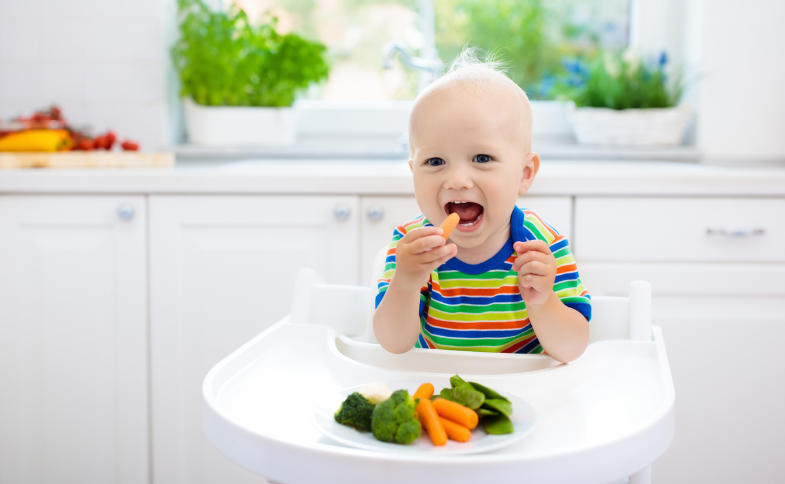Building Healthy Eating Habits for Your Baby: Summer Edition
As summer approaches, it's the perfect time to think about nurturing healthy eating habits for your little one. This guide will help you navigate feeding your baby during the warmer months, ensuring they stay healthy, hydrated, and happy.

Understanding Your Baby's Nutritional Needs
Before we dive into summer-specific tips, let's review the basics of baby nutrition:
- Breastmilk or Formula: For babies under 6 months, breastmilk or formula should be their main source of nutrition. Even as you introduce solid foods, these remain crucial for your baby's diet until at least 12 months of age.
- Introducing Solids: Around 6 months, most babies are ready to start solid foods. Always consult with your pediatrician before making this transition.
- Balanced Diet: As your baby grows, they need a mix of different food groups to support their development. This includes fruits, vegetables, grains, and proteins.
Summer Feeding Tips for Babies
Staying Hydrated
Summer heat can increase the risk of dehydration. Here's how to keep your baby well-hydrated:
- Increase Feeding Frequency: If you're breastfeeding or formula-feeding, offer feeds more often during hot weather.
- Water Introduction: For babies over 6 months, you can offer small amounts of water in addition to breastmilk or formula. Use a sippy cup to help them learn to drink independently.
- Avoid Certain Drinks: Don't give your baby sugary drinks, sodas, or fruit juices. These can lead to tooth decay and don't provide the nutrition your baby needs.

Summer Foods for Babies
1. Fruits: Nature's Candy
Summer brings a variety of delicious fruits. Here are some baby-friendly options:
- Mashed banana
- Pureed peaches or nectarines
- Soft, ripe melon cubes (for babies who can handle finger foods)
- Mashed berries (strawberries, blueberries)
Remember to introduce new foods one at a time and wait a few days before trying another new food. This helps you identify any potential allergies.
2. Vegetables: Powerhouses of Nutrition
Summer vegetables can be a great addition to your baby's diet:
- Pureed zucchini or yellow squash
- Mashed peas
- Steamed and mashed carrots
- Pureed sweet potato
3. Cool and Nutritious Ideas
Try these refreshing options for hot days:
- Homemade fruit popsicles (for older babies)
- Chilled fruit purees
- Yogurt mixed with fruit puree

Food Safety in Summer
Warmer temperatures can increase the risk of foodborne illnesses. Follow these tips to keep your baby's food safe:
- Proper Storage: Always refrigerate perishable foods and don't leave them out for more than two hours (or one hour if it's over 90°F outside).
- Clean Preparation: Wash your hands thoroughly before preparing your baby's food. Clean all fruits and vegetables well before serving.
- Safe Temperatures: Serve foods at a safe temperature. Hot foods should be hot, and cold foods should be cold. Avoid the “danger zone” between 40°F and 140°F where bacteria can grow rapidly.
Creating a Positive Eating Environment
1. Lead by Example
Babies and young children learn by observing the behaviors of those around them, especially their parents and caregivers. If you consistently eat healthy foods in front of your baby, they are more likely to develop a preference for those foods themselves. This can include eating a variety of fruits, vegetables, whole grains, and lean proteins. It's also helpful to avoid consuming unhealthy foods in front of your baby, as this can encourage them to develop unhealthy eating habits.
2. Make Mealtimes Pleasant
Creating a positive and enjoyable atmosphere during mealtimes can help your baby associate eating with happy experiences. This can make them more willing to try new foods and less likely to develop negative associations with food. You can make mealtimes pleasant by playing soft music, using colorful and engaging dishes, and talking to your baby in a soothing voice. It's also helpful to avoid distractions like TV or phones, as these can take away from the focus on eating.
3. Be Patient
It's important to be patient when introducing new foods to your baby. It may take several tries before they accept a new food, and that's perfectly normal. Don't get discouraged if your baby rejects a food at first. Keep offering it to them in different ways, such as mashed, pureed, or in small pieces. You can also try mixing it with a food they already enjoy. With patience and persistence, your baby will eventually learn to enjoy a variety of healthy foods.
4. Avoid Distractions
During mealtimes, it's important to minimize distractions as much as possible. This means turning off the TV, putting away phones and tablets, and focusing on your baby and the food. Distractions can make it difficult for your baby to focus on eating and can interfere with their ability to recognize hunger and fullness cues. By avoiding distractions, you can help your baby develop healthy eating habits and a positive relationship with food.

Addressing Common Summer Feeding Challenges
- Loss of Appetite: Hot weather can sometimes decrease appetite. Don't force your baby to eat if they're not hungry. Continue offering regular meals and snacks.
- Constipation: Dehydration can lead to constipation. Ensure your baby is getting enough fluids and offer foods that can help, like pureed prunes (for babies eating solids).
- Heat Rash: If your baby develops a heat rash, it might make them uncomfortable during feeding. Keep your baby cool and consult your pediatrician if the rash persists.
When to Seek Help
While most babies transition well to summer eating, contact your pediatrician if you notice:
- Signs of dehydration (fewer wet diapers, dry mouth, sunken eyes)
- Persistent diarrhea or vomiting
- Refusal to eat for multiple meals
- Any signs of an allergic reaction after introducing a new food
Related Articles You Might Find Helpful
As you navigate summer feeding for your baby, you might find these other articles on our blog useful:
- How to Introduce Solids to Your Baby
- Summer Safety Tips for Babies: Sun, Heat, and Hydration
- The Importance of Outdoor Play for Your Baby's Development
- Nutrition for New Moms: Eating Well for You and Your Baby
- Healthy Snack Ideas for Breastfeeding Moms
- The Importance of Tummy Time for Infant Development
These articles provide additional information that complements the tips and advice in this post, giving you a well-rounded understanding of caring for your baby during the summer months and beyond.
Final Thoughts
Building healthy eating habits for your baby during summer is all about balance, safety, and creating positive experiences. Remember, every baby is unique, and it's okay if your little one's journey with food doesn't look exactly like others'. Stay patient, keep offering a variety of nutritious foods, and enjoy this special time with your baby. With love, attention, and these healthy habits, you're setting the stage for a lifetime of good nutrition. Happy summer feeding!